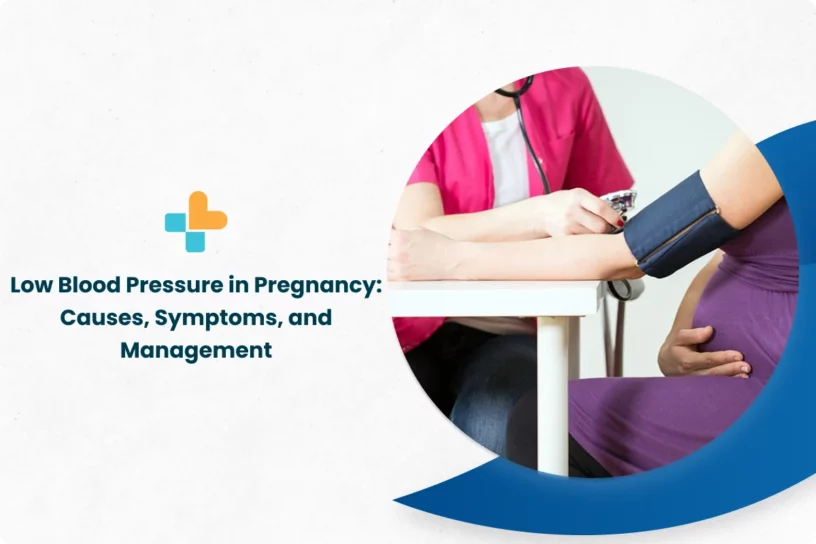Pregnancy can bring about a host of changes in a woman’s body, including fluctuations in blood pressure. Low blood pressure, or hypotension, is a common condition that can occur during pregnancy and can cause a range of symptoms.
In this blog, we will discuss the causes, symptoms, and management of low blood pressure in pregnancy, including when to seek medical attention.
Symptoms of low blood pressure during pregnancy:
Here are some common symptoms of low blood pressure during pregnancy that may be experienced:
- Dizziness or lightheadedness
- Fainting or feeling like you may faint
- Blurred vision
- Nausea or vomiting
- Fatigue
- Rapid or shallow breathing
- Palpitations or irregular heartbeat
- Cold, clammy, or sweaty skin
- Headaches
- Difficulty concentrating or confusion
It’s important to note that some of these symptoms can also be associated with other medical conditions, so it’s always best to consult with a healthcare provider if you experience any concerning symptoms during pregnancy.

What effects could low pressure have in pregnancy?
Low blood pressure during pregnancy can have various effects on both the mother and the developing fetus. Some potential effects include:
- Reduced blood flow to the placenta, can lead to fetal growth restriction and low birth weight.
- Increased risk of preterm labor and delivery.
- Reduced oxygen supply to the fetus, which can lead to fetal distress or stillbirth in severe cases.
- Maternal fatigue and weakness due to reduced blood flow and oxygen supply to the body.
- Increased risk of falls or fainting, which can pose a risk to both the mother and fetus.
It’s important to manage low blood pressure during pregnancy to minimize the potential effects and ensure the health and wellbeing of both the mother and baby.
Treatment options:
Here are some of the treatment options for low blood pressure during pregnancy, which include:
- Diet:
Eating small, frequent meals throughout the day can help regulate blood sugar levels and prevent blood pressure from dropping too low. It’s important to eat a healthy, balanced diet that includes plenty of fluids, fruits, vegetables, lean protein, and whole grains.
- Exercise:
Regular, moderate exercise can help improve circulation and maintain healthy blood pressure levels during pregnancy. Walking, swimming, and prenatal yoga are good options for low-impact exercise.

- Adequate rest and systemic breathing:
Getting enough rest and practicing deep, slow breathing techniques can help reduce stress and anxiety, which can contribute to low blood pressure. It is also helpful to avoid standing or sitting for prolonged periods and to take breaks to stretch or walk around.
- Liquids:
Drinking plenty of fluids, especially water, can help maintain healthy blood pressure levels during pregnancy. Dehydration can cause blood pressure to drop, so it’s important to stay hydrated throughout the day.
It’s important to note that treatment options may vary depending on the individual’s specific health needs and the severity of the low blood pressure. Consulting with a healthcare provider is recommended to determine the best course of action.
Also Read : 15 Rare Pregnancy Symptoms You May Experience
Conclusion
In conclusion, low blood pressure during pregnancy can be a common and potentially concerning issue that requires management to ensure the health and well-being of both the mother and baby. Treatment options include a healthy diet, moderate exercise, adequate rest and breathing techniques, and staying hydrated. If you experience concerning symptoms or have any questions about managing low blood pressure during pregnancy, it’s important to consult with a healthcare provider for personalized guidance and care.
At Ayu Health, we provide a range of healthcare services to support women’s health during pregnancy and beyond. Our team of healthcare professionals is dedicated to providing personalized care and support to help you manage your health and wellbeing. Contact us today to learn more about our services and how we can support your healthcare needs.
Our Hospital Locations
Gynaecology Surgery Hospitals in Chandigarh | Gynaecology Surgery Hospitals in Bangalore | Gynaecology Surgery Hospitals in Jaipur | Gynaecology Surgery Hospitals in NCR | Gynaecology Surgery Hospitals in Hyderabad
Our Doctors
Gynaecology Surgery Doctors in Chandigarh | Gynaecology Surgery Doctors in Bangalore | Gynaecology Surgery Doctors in Jaipur | Gynaecology Surgery Doctors in NCR | Gynaecology Surgery Doctors in Hyderabad
About the Author





